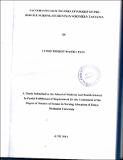Factors Influencing Perceptorship of Pre-Service Nursing Students in Northern Tanzania

View/
Date
2014-06Author
Lyimo, Modest Masika Paul
Type
ThesisLanguage
enMetadata
Show full item recordAbstract
The benefits of clinical experience in nursing education have been overlooked for many years since the nursing education shift from hospital settings to university settings. The purpose of the study was to identify factors influencing preceptorship of pre-service nursing students in Northern Tanzania. A descriptive survey design was used. The study population was preceptors whereby the sample size was composed of all preceptors (68) from the nine Nursing school located in the Northern zone of Tanzania. The questionnaire was used as a tool for collecting the data Pre-test was done at Muheza school of Nursing to ensure reliability and validity. Data was analyzed by using Statistical Package for Social Science and results presented in Ratios, figures, and tables. The findings revealed that; none of the preceptors had undergone formal training. All preceptors said that for effective preceptorship one needs to be trained in clinical learning and teaching, assessment and evaluation and communication skills. A majority (91 %) had not updated their knowledge meaning no seminar or training had been attended for the last one year. All preceptors are assigned other routine ward duties like other nurses regardless of preceptorship duties. The study also revealed that the ratio of preceptor to students is 1: 20 except for KCMC School of nursing where the ratio is 1:8. All preceptors perceived clinical teaching as important as classroom teaching. They mentioned challenges of preceptorship as; preceptors being assigned routine ward activities, lack of opportunity to update their knowledge, inadequate cooperation between faculty and preceptors, limited clinical follow-up's from the tutors, and students being used as manpower in the clinical area to cover the shortage. The researcher recommended the following; Ministry of Health and Social Welfare should ensure that preceptors training and the credentialing program is developed for effective preceptorship. The number of preceptors should be increased in relation to the increasing number of students. Ministry of Health and Social Welfare should ensure that the number of teaching staff is adequate for effective students' clinical follow-ups. The cooperation between the teaching institution and practicum site should be improved and maintained for effective preceptorship.
Publisher
KeMU
Subject
clinical experienceDescription
RT 81.P3 2014
